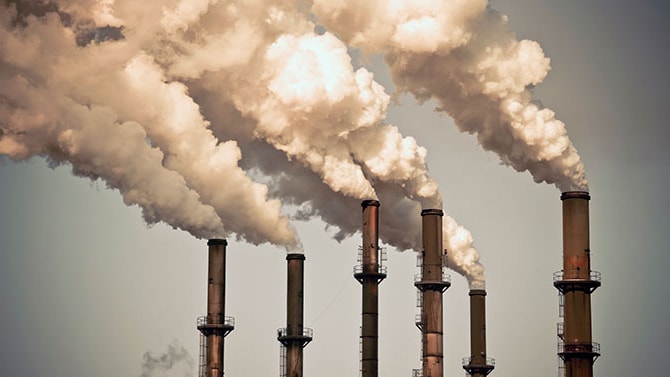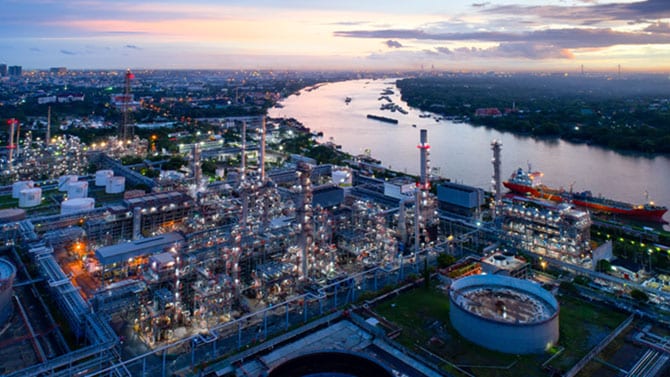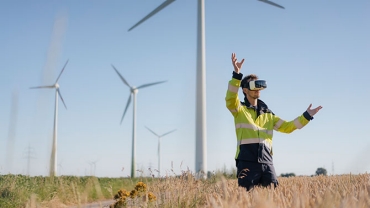
A national CO2 tax to reduce annual industrial emissions with 14.3 megatonnes by 2030
The Dutch government wants the country to emit 49 percent less CO2 annually in 2030 compared to 1990s levels. This will require a substantial contribution from the industrial sector, which will need to to reduce its emissions by 14.3 megatonnes by 2030. To ensure achieving this goal, the Dutch government is proposing a CO2 tax that will increase from 30 euros per tonne of CO2 in 2021 to 125 euros per tonne in 2030.
PwC Partners Niels Muller and Gülbahar Tezel conducted a level playing-field study for the Ministry of Economic Affairs and Climate Policy. The study was published on Budget Day at the same time as the proposed legislation for a CO2 tax. Both Muller and Tezel agree with the economic principle of CO2 taxation. Without a tax on emissions, producers and consumers will not take the harmful consequences of CO2 emissions sufficiently into account to influence their production and consumption decisions. This would lead to too high emissions. A tax on CO2 emissions would ensure that the social costs would be internalised by producers and consumers, which would reduce greenhouse gas emissions.


CO2 taxation is most efficient if implemented internationally
One of their main criticisms of the Dutch national approach is exactly that it is national. A CO2 tax is most efficient if it is implemented internationally, preferably globally, but at the very least at a European level. The European Union has had a system of pricing greenhouse gas emissions since 2005 through the EU Emissions Trading System (EU ETS). In the week of the Dutch Budget Day, the European Commission also announced a tightening of the EU ETS.
The risk of a national approach is that economic activity, and with that its emissions, will move to other countries. National subsidies that support the industrial sector in making its production processes more sustainable can mitigate this risk. However, the subsidy system would only be effective if sufficient money is available and if the companies that are subject to the CO2 tax can actually make use of it. Clarity about the (future) availability of sustainable infrastructure is also very important for keeping industrial production in the Netherlands. The comments of tax specialist Niels Muller and economist Gülbahar Tezel on the proposed Dutch legislation and on the subsidies that are planned to counteract leakage effects are reflected in the level playing-field study.
Challenges with a Dutch national CO2 tax
- Risk of leakage effects
- Focus areas for compensating subsidies
- Tightening the EU ETS
Risk of leakage effects
CO2 taxation in only one country may lead to leakage of activities ánd emissions
According to economic theory, taxation is an effective way to reduce negative externalities (in this case harmful greenhouse gas emissions). A well designed tax will make the polluter pay for those emissions. It also gives the polluter an incentive to reduce emissions and/or invest in technology or behavior to reduce or eliminate its emissions. However, if the pricing of greenhouse gases takes place only in one part of the relevant market, as is the case for the Netherlands for example, while companies compete worldwide, there is a risk that economic activity will move to other territories and cause ‘leakage’ of economic activities and carbon emissions.
If these companies cannot raise their prices to customers, because of fear of losing market share to competitors, the additional costs of a tax will be at the expense of profit. This creates a risk that companies will move their production and investments to other countries where emissions are not taxed. The risk of ‘leakage effects’ is therefore real. Industrial players produce in markets that are broader than the Netherlands. The level playing-field study draws on several objective sources to show this, including the carbon leakage list of the European Commission (on the basis of which it is determined which sectors are allocated free emission permits in the EU ETS system).
Gülbahar Tezel: "In essence we are not only talking about the leakage of economic activity, but also about the leakage of emissions abroad. There is even a risk that emissions will increase, because efficiency in production is not the same everywhere in the world."
Niels Muller: "One would hope, for example, that the Netherlands would develop into a center of excellence for sustainable chemistry. This tax can counteract this, because it increases the risk that companies will invest elsewhere because of the regulatory uncertainty in the Netherlands."
Other cost-increasing measures are adding to this
PwC's level playing-field study does not only look at the effects of the CO2 tax, but also includes changes in the Dutch energy tax (EB) and the sustainable energy surcharge (ODE), as well as the discontinuation of the compensation for indirect EU ETS costs. It is this combination of the tax and the other cost-increasing measures that will hit some companies hard. Niels Muller: "Large gas consumers in particular will pay more energy tax and sustainable energy surcharge in addition to the CO2 tax. This combination will significantly increase their cost prices."
Ample granting of dispensation allowances in the first years helps to a limited extent
The tax, as proposed by the government, has been designed in such a way that companies receive a certain amount of exempted emissions (dispensation rights), after which the tax is levied on the excess CO2 emitted. This ‘excess’ is determined on the basis of an EU benchmark. The dispensation rights have a reduction path: in the initial period efficient emissions (efficient compared to the European benchmark), and also part of the inefficient emissions, are exempted by means of dispensation rights. In the final period, part of the efficient emissions will also be taxed. The price component follows a growth path: the tax will be relatively lower in the initial period and will increase to 125 euros in 2030.
The relatively low prices and taxed volumes in the initial period are intended to give companies time to reduce their emissions, but according to Niels Muller, this only helps the sector to a limited extent. “For existing installations, this may mean postponing the real increase in the tax burden for a few years, but that alone will not help enough to prevent a possible leakage. Due to the high investment costs, large industrial parties are looking decades ahead when planning their investments. Based on the total expected costs over the depreciation period, companies make an analysis of whether an investment can be made profitable. Companies are currently already wondering whether they will be able to make major maintenance investments here.”
Focus areas for compensating subsidies
The size of subsidy funds available is unclear, and expensive technology, such as hydrogen, is excluded
The risk of leakage of economic activity and thus the leakage of emissions can be mitigated by subsidies. In principle, PwC Partners Gülbahar Tezel and Niels Muller consider the SDE ++ (Sustainable Energy Transition Scheme) subsidy that is available for this to be a good instrument. According to them, the Netherlands is often at the forefront of subsidy schemes, but they still wonder whether the subsidy will be sufficient to cover some unviable part of investments (which cannot be passed on to customers).
Gülbahar Tezel: "During our research we could not determine the exact amounts. It is therefore unclear how much subsidy is available for the industrial sector. This makes it very complicated for parties to base their investment decision on."
Niels Muller: "The SDE ++ system grants subsidies based on the cost price of the CO2 emissions avoidance. Simply put: the majority of the subsidy money goes to the cheapest solutions, such as wind energy on land and solar energy. Hydrogen, which is very important as an alternative to fossil fuel for industry, is still very expensive in this comparison and is therefore left out. For the longer term, an adequate subsidy framework would be also very important for this type of investment."
Gülbahar Tezel: "I understand that SDE ++ emphasises cost efficiency. After all, we want to spend tax money as efficiently as possible. However, some companies rely on more expensive options due to the nature of their products. The location of the companies can also play a role in whether they can make use of existing subsidies. For example, some companies are too far away from underground CO2 storage. So if we want to see these companies become more sustainable, we need to consider other instruments."
Subsidy needed for research into new and alternative sustainable technology
Gülbahar Tezel and Niels Muller therefore argue in favour of expanding existing subsidy schemes as well as for research into new technologies and into making existing sustainable technologies cheaper. Gülbahar Tezel: “The SDE ++ focuses on cost efficiency in the short term, but we should not lose sight of the long term. Grants for research into new clean production technologies or into cost reduction of existing alternatives are very important. If we reduce costs, the need for subsidies will disappear. In this way we can reduce the costs of the transition in the longer term.”
Clarity about future infrastructure is an absolute must
To achieve the Dutch government’s objectives, clarity is needed about the necessary infrastructure. Niels Muller: “If we expect companies to electrify, the electricity grid must be able to cope with the extra demand for electricity. Clarity about the future of green hydrogen production is also important in order to enable sustainable investments by industrial players.”
Both PwC Partners recommend the government investigate how uncertainties for business can be eliminated. Gülbahar Tezel: “The government is already doing a lot of research into what infrastructure will be necessary in order for the Netherlands to be sustainable. I hope these studies will provide clarity on that soon.”
Niels Muller: “A good example is the way in which the rollout of offshore wind is organised by the government. Thanks to a clear long-term agenda, certainty of infrastructure and a central government helpdesk, among other things, costs there have fallen spectacularly.”
Tightening the EU ETS
Less risk of leakage if the EU ETS price becomes higher than the current forecasts
One reason for the introduction of a Dutch CO2 tax is that the government believes that the European emissions trading system (EU ETS) does not yet make an adequate contribution to the goals of the Dutch Climate Agreement. The CO2 tax as presented on the Dutch Budget Day sets a minimum price. The difference between the fixed tax rate and the EU ETS price is the amount that companies have to pay. A higher EU ETS price therefore reduces the competitive disadvantage for Dutch companies.
In the forecasts made by PwC for the level playing-field study, the EU ETS price will be 47 euros in 2030. The situation has since changed: in the week of the Dutch Budget Day, the European Commission announced that it intends to increase the greenhouse gas reduction target from 40 percent to a minimum of 55 percent compared to the baseline year 1990. One way to achieve this is to further expand and tighten the EU ETS system. The European Commission wants more sectors to be included under this scheme, i.e. more players will pay for greenhouse gas emissions. At the same time, the Commission wants to increase the emissions price by reducing the number of allowances. But Gülbahar Tezel and Niels Muller are not immediately reassured about this: “The Dutch tax will rise sharply to 125 euros per kilotonne of CO2 emitted in 2030.”
Joining Europe is a better option
Gülbahar Tezel: “Emissions are a global problem and the energy intensive industry operates globally. An international approach is therefore preferred. Existing European industry taxation was not strict enough. But that is changing due to the new ambitions of the European Commission. Moreover, acting as one player in Europe, we can better protect ourselves against carbon leakage. The European plans to introduce a carbon border adjustment mechanism and tighten the Energy Tax Directive are precisely intended to protect the level playing field for the European industrial sector. The European trading system is also efficient because it allows emission permit trading between countries. Moreover, it adapts to economic reality. We have seen ETS prices drop temporarily due to the corona crisis and to pick up again as economic activity got back on track.”
Niels Muller: "We understand that the cabinet is dealing with a political reality that requires every polluter to contribute to the solution. But it would be better if the Netherlands advocates for tightening the EU ETS in Europe. It is better for the level playing field, but above all better for the environment. It is not without reason that Commissioner Timmermans has already said that he hopes that the Netherlands will reconsider whether it really wants its own national tax."
Gülbahar: "The dream should be a global tax. A European tax system would be a wonderful starting point for this global dream".
Contact us

Partner, Energy transition and sustainable energy, PwC Netherlands
Tel: +31 (0)65 160 08 61

Gülbahar Tezel
Partner Strategy&, Lead Denktank Energietransitie, PwC Netherlands
Tel: +31 (0)61 391 56 71


















